A few summers back, we spent over six weeks hiking, biking, and climbing the Sierra. While we’ve lived in Tahoe for years, I always thought of the Sierra as “nice.” I’ve visited forty-two states including Alaska. Been to all of Canada and even explored Europe. The Alps, the Tetons, and even the Chugach were more magical to me. It wasn’t until we started to explore each nook and cranny of this mountain range we call home that I began to understand why John Muir was so poetic. Why so many call it the “Range of Light.” Like a bolt of lightning, a sense of awe came over me when hiking the Lake Sabrina to Blue Lake trail in Bishop. I realized they’re not just a mountain range… but a key to unlock something emotional in your soul.
Quick Facts
Difficulty: Moderate | Length: 5.9 miles (out-and-back) | Climbing 1,453′
While the trail doesn’t involve any scrambling or steep climbs, it does start at a lung-busting 9,128 feet above sea level. Even if you’re in great shape, coming from sea level will make this one feel tougher—so take it slow.
Be sure to bring plenty of water (or a LifeStraw), as most of the trail is exposed with minimal shade. Hydration and pacing are key out here!
All About The Drama… Dramatic That Is
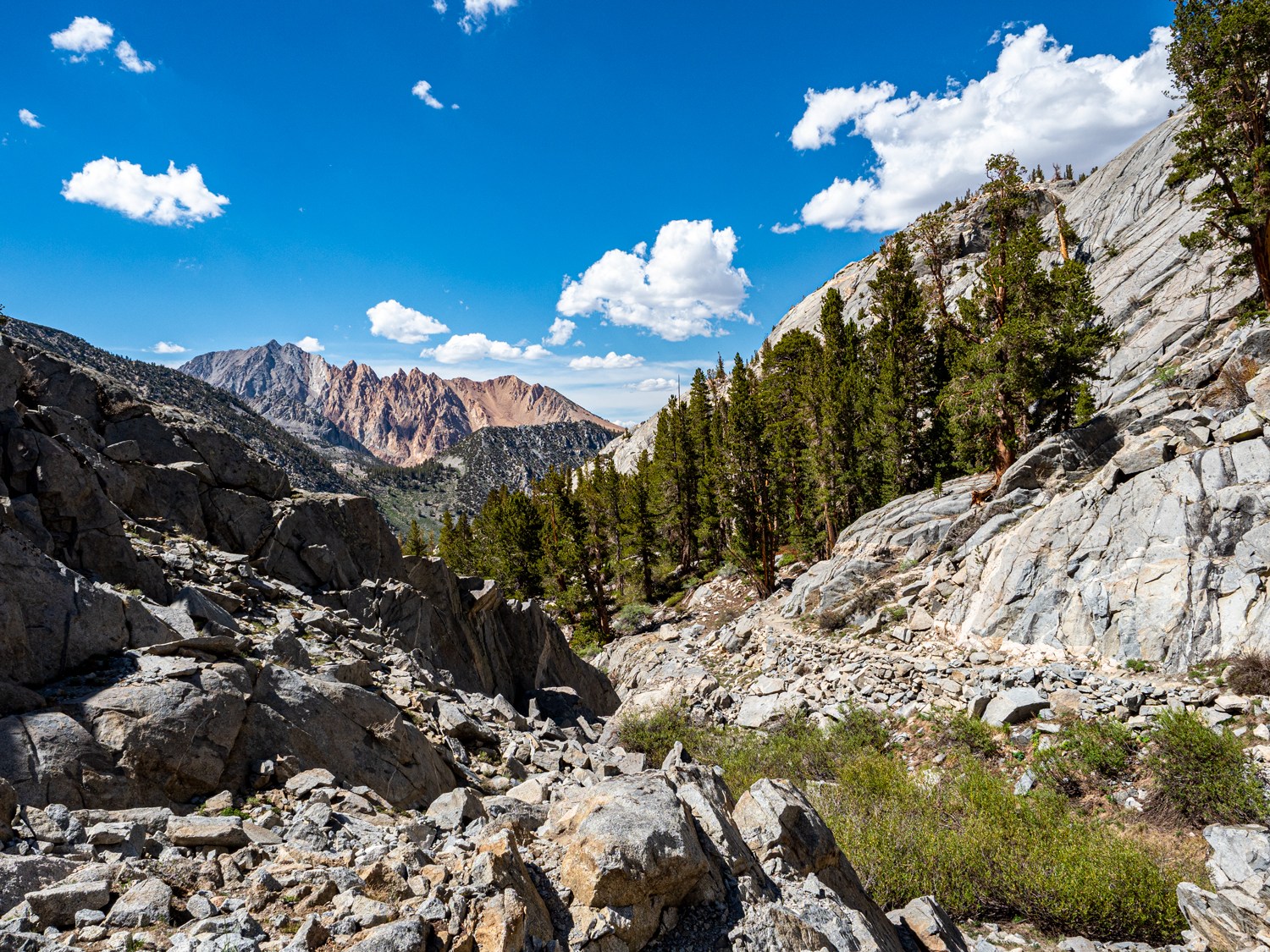
What caused this feeling of emotional “awe” to come out? Out of any part of the Sierra, I think it’s due to how dramatic this section surrounding Bishop California is. For starters, the climate. Tucked in the center of Owens Valley, the town itself rarely receives snowfall even on the coldest winter days. But the mountains on both sides can get upwards of five hundred inches in a season. On the flip side, summers normally reach triple digits within the valley, but up in the High Sierra, you’ll find temps hovering twenty to thirty degrees cooler.
The Scenery
Then you have how BIG the scenery is. Situated at four thousand feet above sea level, to the west are the legendary Sierra jutting up another nearly ten thousand feet from the valley floor. And to the east are the White Mountains which are nothing to sneeze at either. These also top out at fourteen thousand feet above sea level. It may sound normal, but it’s how quickly it goes from four thousand to fourteen thousand feet. And this is all within an hour’s drive.
A LOT To Explore
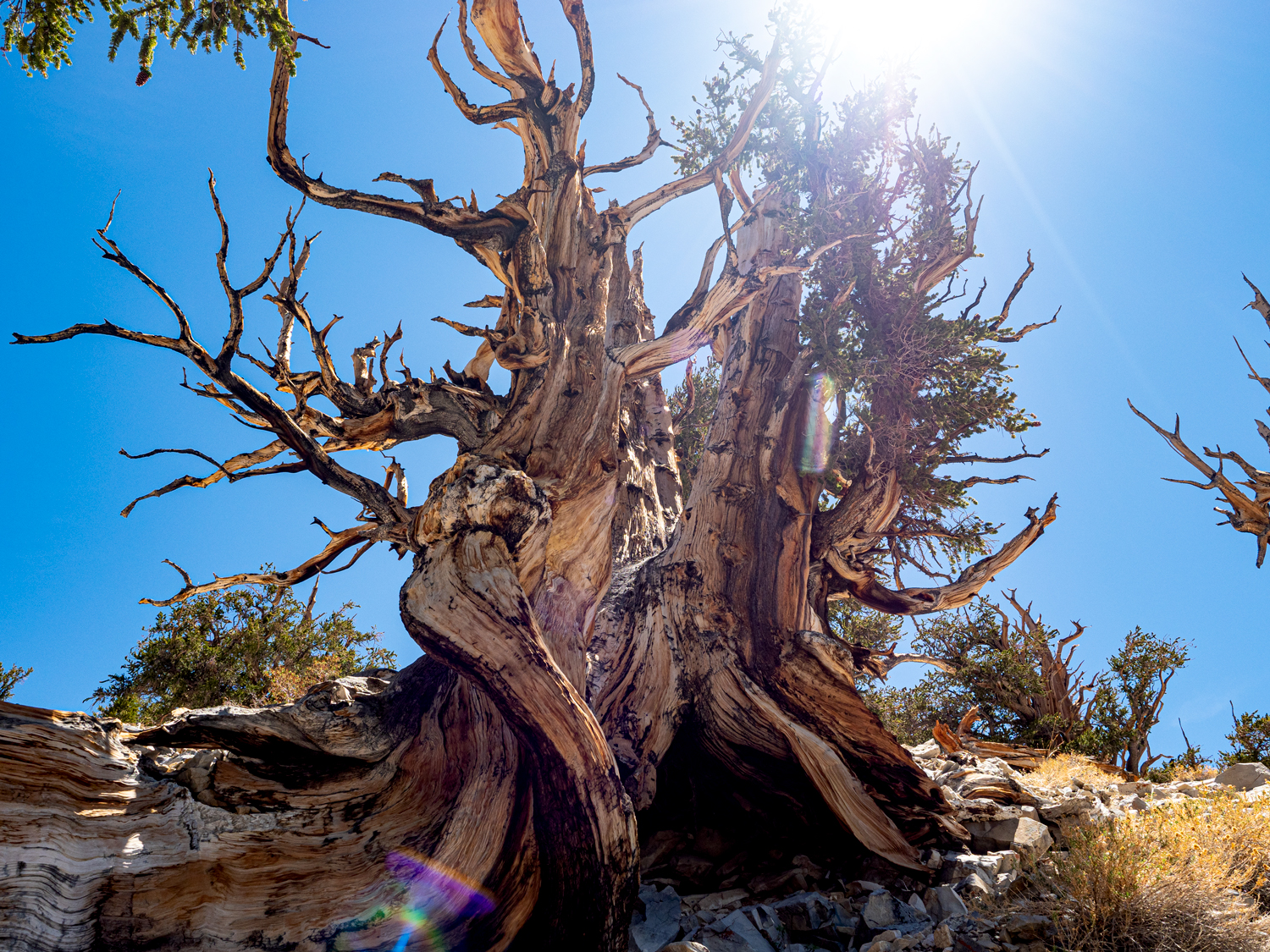
Depending on how much time you have and your level of fitness, there is a lifetime’s worth of trails you could explore. Both the multi-day routes of the Pacific Crest Trail and John Muir Trail wind their way past Bishop following the Sierra Nevada. For most visitors, Bishop hiking in the summer consists of trails within the Bishop Creek Canyon area. It’s also a good idea to set aside an extra day to explore the Ancient Bristlecone Pine forest to the East in the White Mountains.
Bishop Creek Canyon
Taking Highway 168 west, you can be at a trailhead in less than twenty minutes. As the name suggests, this canyon is named after the main drainage which is called Bishop Creek. Within its thirty square miles, you’ll find three forks of the creek that you can choose to venture further into – North, Middle, and South Forks. Each of them containing a large alpine lake to base your fun from. For the North Fork, it’s North Lake. The south is South Lake. And last but not least, the Middle Fork’s Lake is Sabrina (pronounced “Sah-bry-nuh”).
Getting’ Looney For Some Beans

For our day’s adventure, our friends who live in town told us to start at Lake Sabrina and head up via the Sabrina Basin trail to Blue Lake. We grabbed a quick bite to eat at the Looney Bean Café since they open at 6 am. For a healthy alternative that’s still tasty, the Beet Egg Bowl can’t be “beet”. Coming with arugula topped with chopped beets, nuts, gorgonzola cheese, balsamic vinegar, and two yoked eggs, it’s light and refreshing. For carnivores, their homemade pork sausage and applewood smoked bagel was to die for. Since we were hiking for the day, I grabbed a chocolate croissant for the road and was pleasantly surprised. The dough was flaky and light and combined well with the chocolatey inside without it being overly sweet.
The Range Of Light
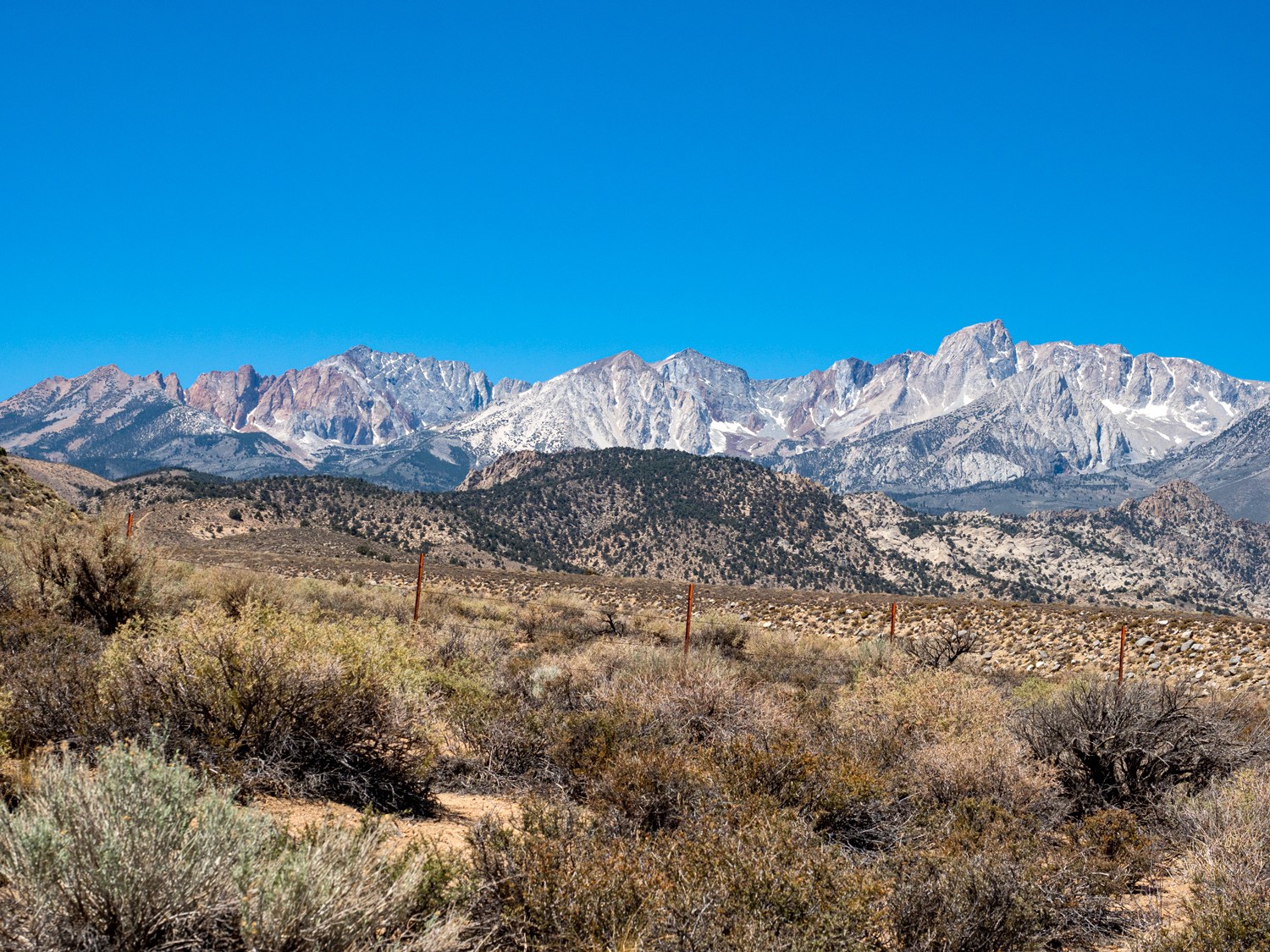
Zipping out of town we quickly began our ascent up into the Eastern Sierra. The first morning light making the ridgeline look as if it was painted by a Giant. Lines of alabaster white, blush pink, and amber oranges within the rocky mountainside reminded me of a veiny granite in a high-end kitchen.
From Sage To Razor-Sharp Granite
As we make a swooping turn, the rocky foothills filled with sagebrush are quickly replaced with a deep cut canyon. On one side is a canopy of trees while the other lush grasslands. Along Bishop Creek itself are a grove of Aspens. Heading higher, the canyon continues to get deeper. Craggier. We’re given glimpses of the tall peaks in the distance until finally we arrive at Lake Sabrina.
Aspens, Wildflowers, and an Alpine Lake

The Sabrina Trailhead is located on the northeast corner and follows the lake’s southern shoreline. Wildflowers dot the landscape in between a few Aspens and other low colorful bushes. Most of this section is in the sun so the earlier you do it the better. The good news is it gives you the opportunity to really take in the scenery. Like a deep blue jewel, this large lake is cupped by two giant mountainsides.
Stream Crossing And Shade
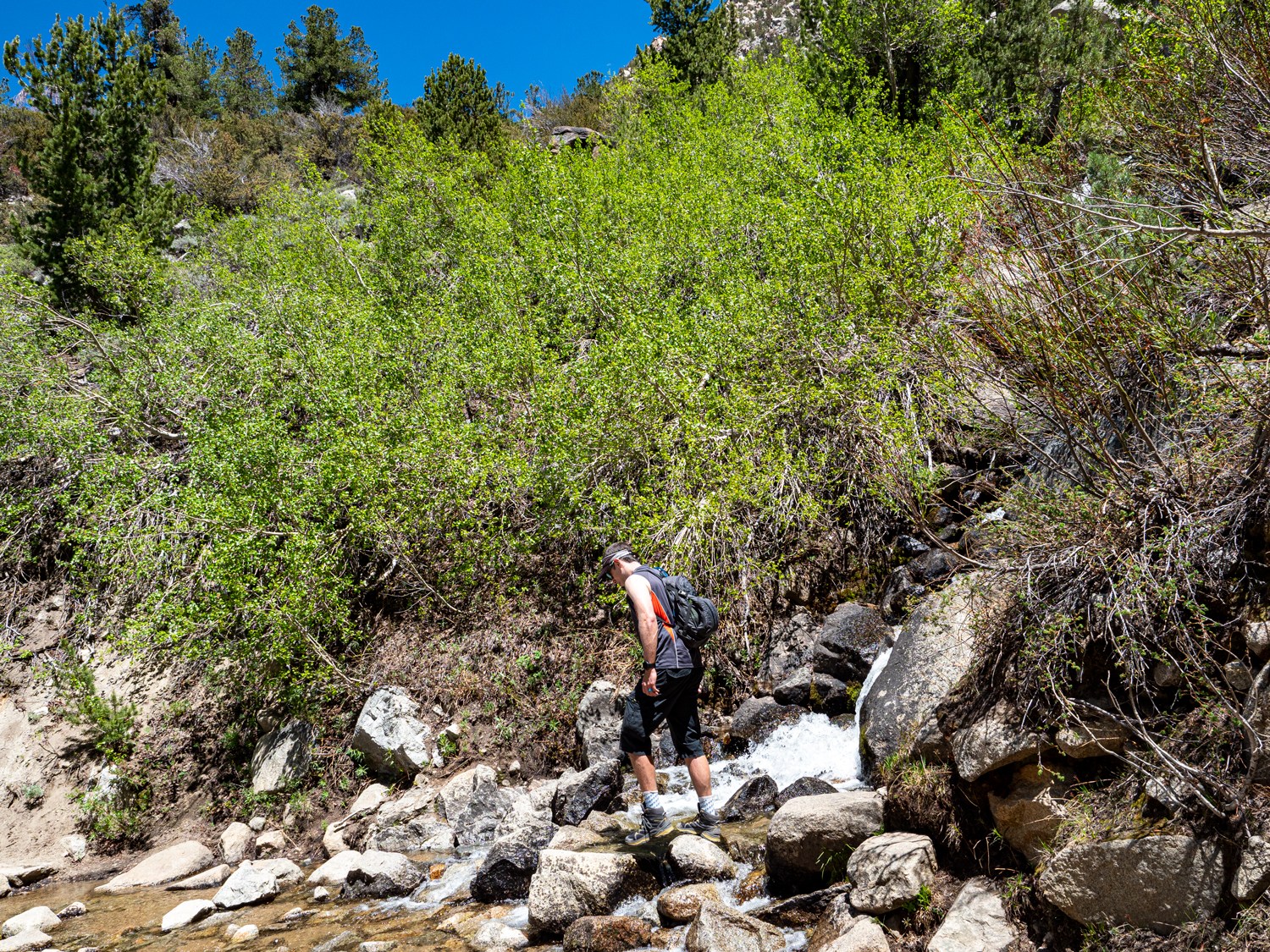
As you near the end of the lake, keep your eyes peeled for the corner of the lake. Here you’ll see a set of falls that are fed by the alpine lakes from above. The first mile is relatively flat but as you pass the George Lake sign, the route begins to climb. Nearing the end of the Sabrina basin, you’ll cross a stream and are rewarded with shade from the canopy of pine trees.
Humans Go Marching Hurrah, Hurrah
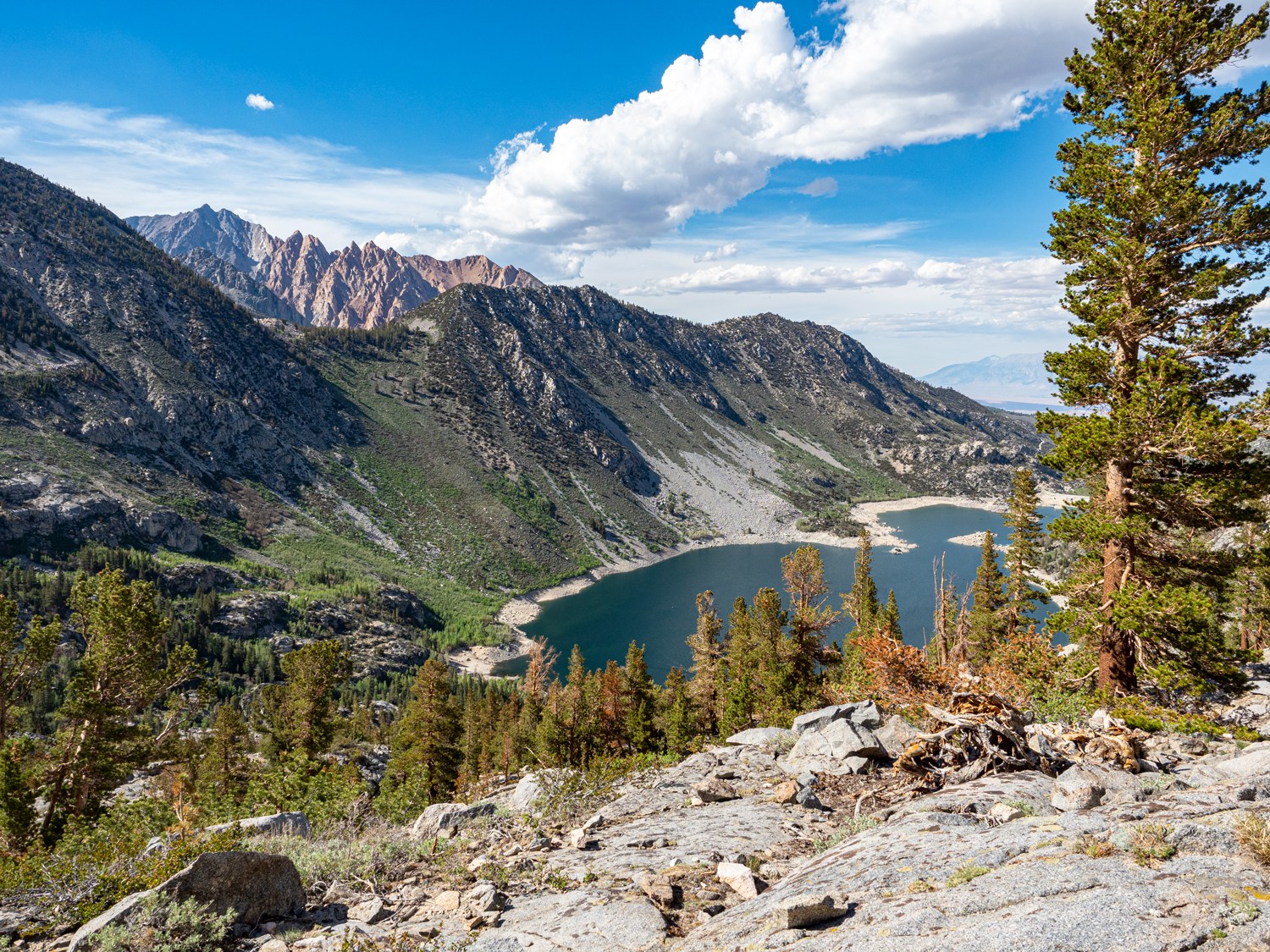
Throughout this section, you’ll switch back up the mountainside climbing ever so higher. In between the trees, be sure to give yourself a moment or two to take in the scenery. As you reach the first ridgeline, the trees give way to high alpine granite.
Where Do These Stairs Go?
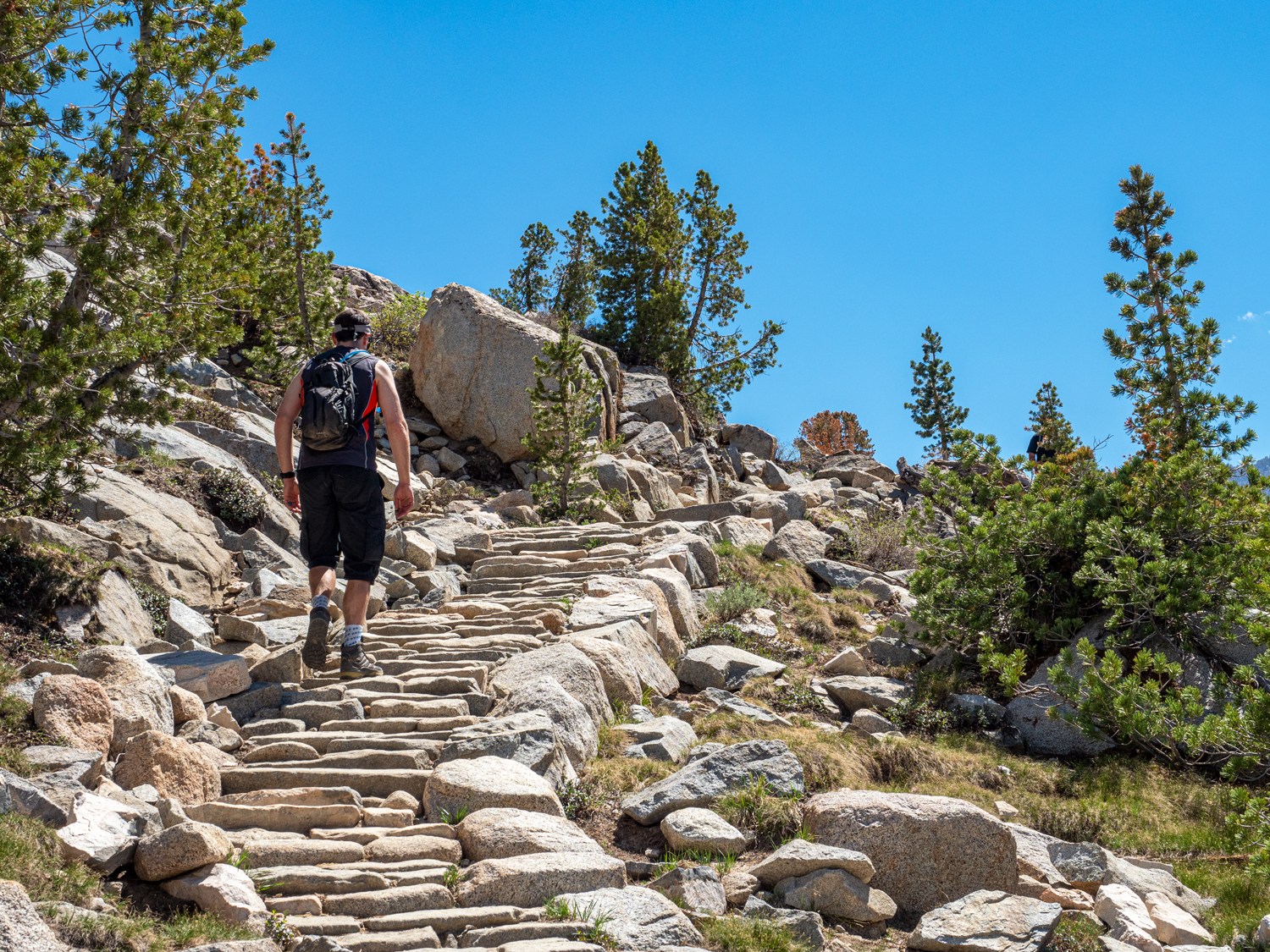
This trail might have the most set of stairs I’ve ever seen. Two thoughts popped into my head as I climbed up what felt like thousands of handmade steps. #1 – who the heck had to do all this work? #2 – as I looked up at the next set of steps, it was the scene in Ghostbusters when Ray Stantz said,
“Where do these stairs go?”
“They go up.”
After a short respite of flatness, we continued our climb up another tight canyon filled with massive sharp boulders in the valley. Small boulders were perfectly fitted to create a set of large steps. As we got through the sun-drenched boulder field, we were again in another forest. This time the trees were short and hardy, showing how brutal the winter’s weather could be at this elevation.
The “Moment”
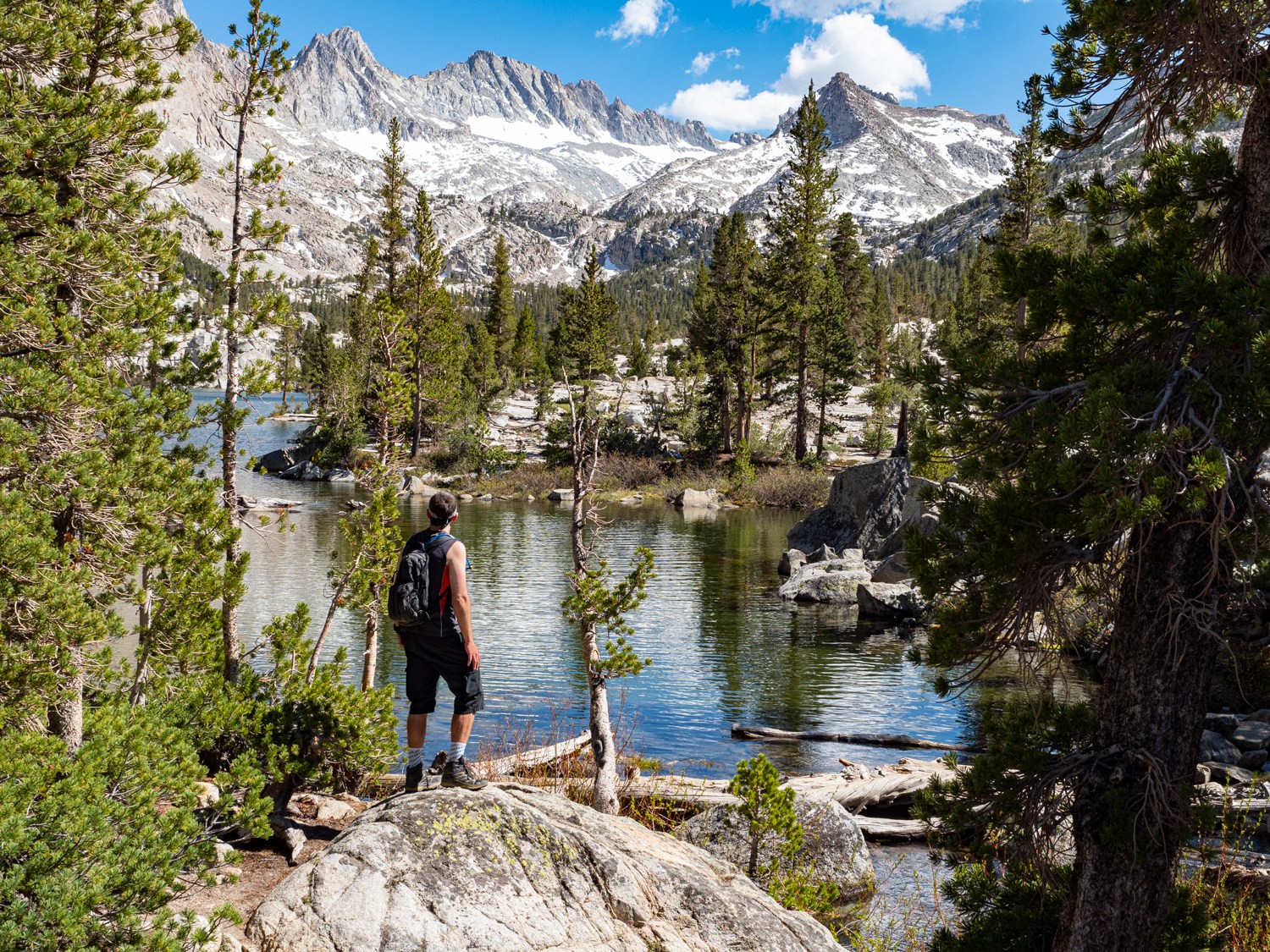
After what seemed like hours under a blazing sun, the tight glades finally gave way. There it was… Blue Lake. Personally, I don’t think I’ve ever visited a lake with such a lackadaisical name with such beauty. The deep opal-colored waters contrasted against the bleached granite. In between each granite slab, hunter green moss and grass blades grew.
Stepping onto the shore I looked down into the clear waters. Dozens of fish of different sizes moved and darted under the calm surface. Every so often one would break the glassy plane grabbing a tasty insect. Just across the shore, a fly fisherman casted his lure like an Olympic rhythmic gymnast.
My eyes went past him. Beyond the serene lake waters. In the distance, the Sierra Crest loomed large. The sheer mountain faces of pewter colored granite were still dotted with daisy white snow. I closed my eyes for a moment and felt the cool breeze against my skin.
I Now Understand John Muir
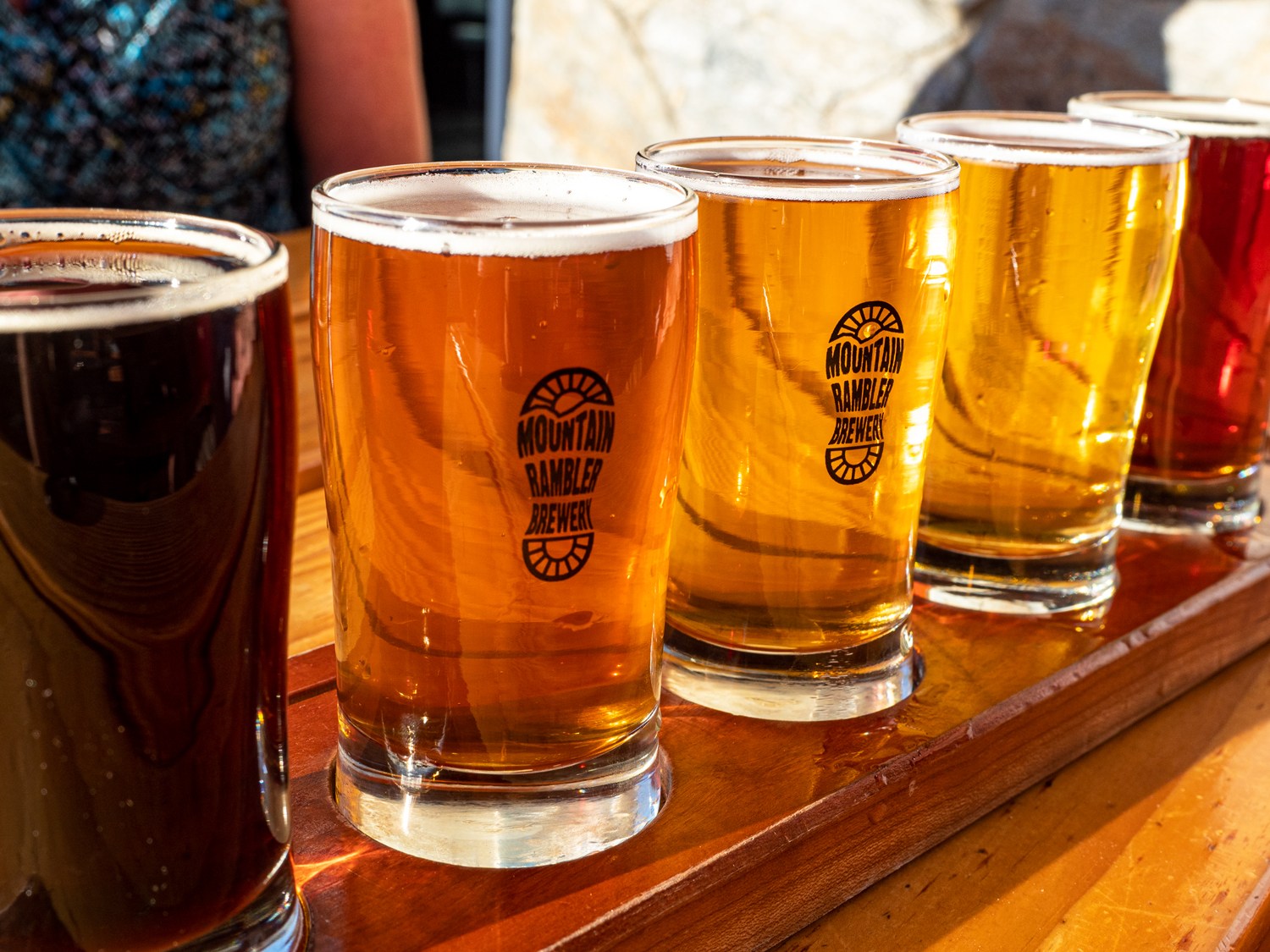
It was here at this moment that I suddenly realized why John Muir loved these mountains so much. As he so eloquently put it, “Of all the mountain ranges I have climbed, I like the Sierra Nevada the best.” It’s the ability of combining all five senses into one single millisecond that feels as if it will last forever. You feel big AND small at the same time. That you’ve been given a gift. An opportunity to experience Mother Nature in all her splendor. As we made our way back to Bishop, we stopped at the Mountain Rambler Brewery for a celebratory beer. Sipping on their award winning Venusian blonde beer, a smile crept over my face.







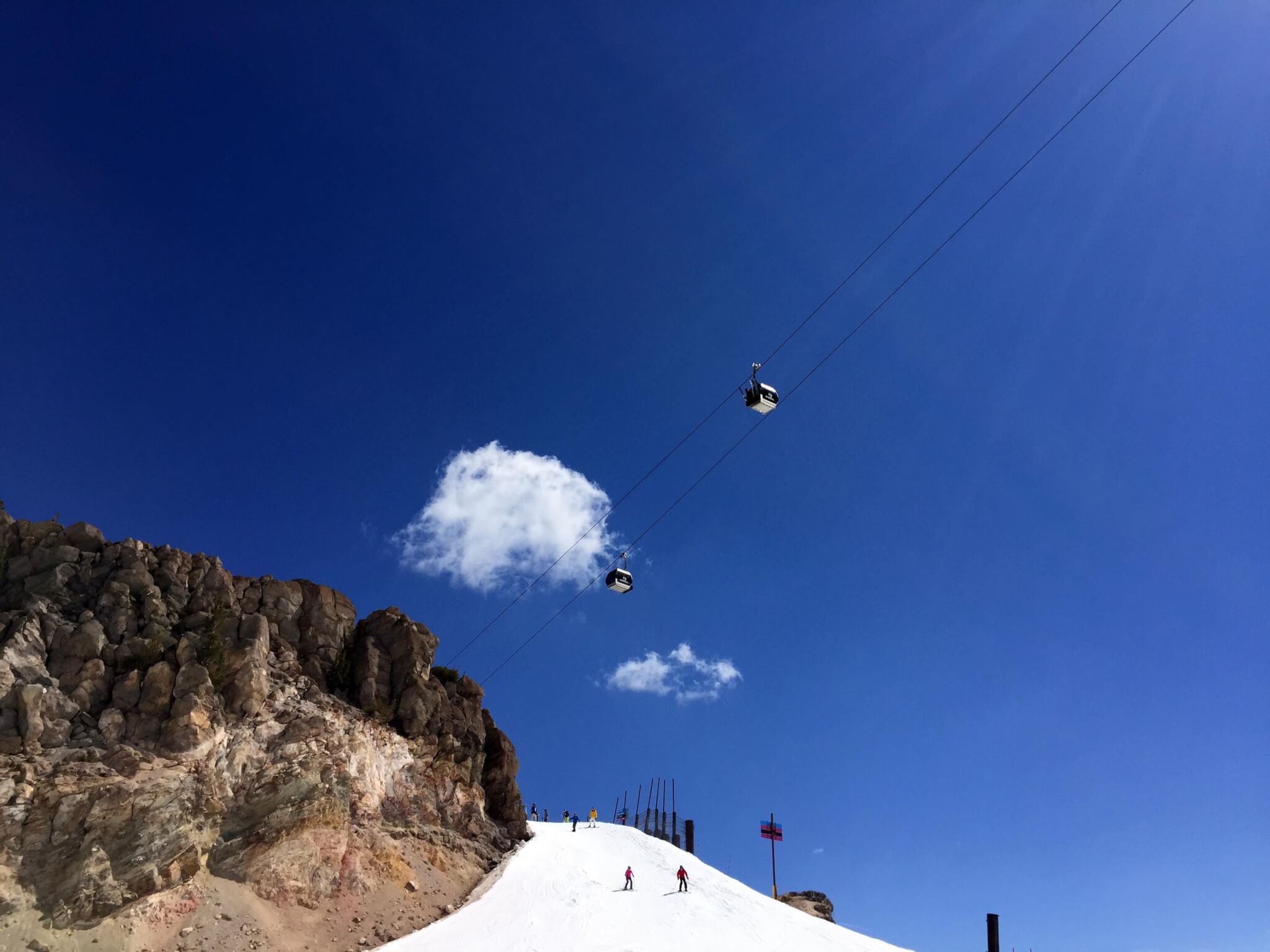



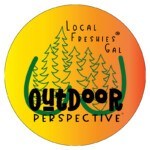
Thank you for this descriptive teaser. I want to go hike the Sierras right now…